The biggest challenge the pandemic Covid19 and the sudden lockdown that followed was hunger. Though the Government of India announced a variety of measures for food security many people were not covered by the scheme. The Prime Minister of India announced the first 21 days of India’s lockdown on 24 March and in his address to the nation he said, « Jaan hai toh jahaan hai » Only if there is life there will be everything.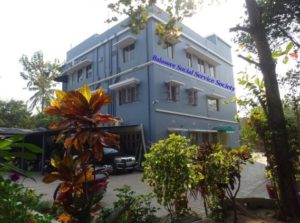
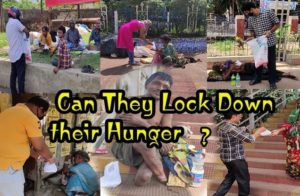 Balasore Social Service Society, the social wing of the Diocese of Balasore, set out for the Emergency intervention, being aware of its moral duty to save life at any cost, gathering the strength and capacity, to reach out to the vulnerable people, affected by the sudden nationwide lockdown.
Balasore Social Service Society, the social wing of the Diocese of Balasore, set out for the Emergency intervention, being aware of its moral duty to save life at any cost, gathering the strength and capacity, to reach out to the vulnerable people, affected by the sudden nationwide lockdown.
BSSS when learned that millions of migrants and their families dying along the roads, from thirst, heat, hunger and exhaustion in its first phase of the intervention, with due permission from District administration, reached out to the people on the streets of Balasore, to feed them with a meal. People of generous hearts joined the campaign, extending their share to feed the starving brothers and sisters on the streets. BSSS continues this drive even today, by providing cooked food for 20 to 30 persons every day, with the help of the good Samaritans of the place.
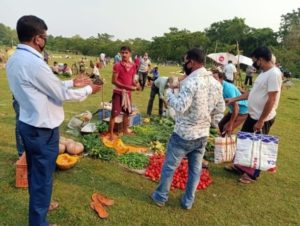 The soaring prices of essential commodities during the lockdown doubled the woes of the common people. People were forced to purchase commodities at whatever prices fixed by the retailers who were charging anything between Rs 10 and Rs 20 above the MRP on everything in the markets. The authorities had the responsibility to keep a strict vigil to prevent profiteering by the traders. BSSS was requested in its second phase to join hands with the Emergency Department of Balasore, to supervise 4 crowded markets of Balasore – Aroda Bazar, Ananda Bazar, Mandal Bazar and Bhalighat. The staff of BSSS,devided into four groupswith all the precautions against Covid 19,from 5. 30 am to 11.30 am monitored the social distancing, use of masks and checking the market price of the commodities and assisted the authorities to keep a vigilon the traders from becoming greedy and harassing the people with an unreasonable price on the essential commodities.
The soaring prices of essential commodities during the lockdown doubled the woes of the common people. People were forced to purchase commodities at whatever prices fixed by the retailers who were charging anything between Rs 10 and Rs 20 above the MRP on everything in the markets. The authorities had the responsibility to keep a strict vigil to prevent profiteering by the traders. BSSS was requested in its second phase to join hands with the Emergency Department of Balasore, to supervise 4 crowded markets of Balasore – Aroda Bazar, Ananda Bazar, Mandal Bazar and Bhalighat. The staff of BSSS,devided into four groupswith all the precautions against Covid 19,from 5. 30 am to 11.30 am monitored the social distancing, use of masks and checking the market price of the commodities and assisted the authorities to keep a vigilon the traders from becoming greedy and harassing the people with an unreasonable price on the essential commodities.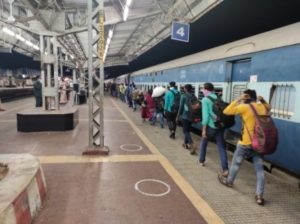
There were millions of migrant workers stranded without work or food in the cities who were desperate and the government provided emergency trains to carry them back to their home villages. Extending the collaboration to the District administration, BSSS Covid warriors, monitored Balasore Railway Station at the arrival of the special Shramic trains, with the migrant returnees at wee hours, along with the district administration.
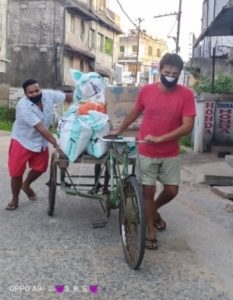 In the Containment Zones, only essential activities were allowed. There was strict perimeter control to ensure that there was no movement of people in or out of these zones, except for medical emergencies and for maintaining the supply of essential goods and services. BSSS Covid warriors volunteered in monitoring the Containment Zones of Balasore and delivered the essential materials and dry food kits to the families, under the supervision of the Govt. officials.
In the Containment Zones, only essential activities were allowed. There was strict perimeter control to ensure that there was no movement of people in or out of these zones, except for medical emergencies and for maintaining the supply of essential goods and services. BSSS Covid warriors volunteered in monitoring the Containment Zones of Balasore and delivered the essential materials and dry food kits to the families, under the supervision of the Govt. officials.
BSSS Positively responded, to the request of the Emergency Department and provided dry food kits, mattresses to the NariSakti, women’s rehabilitation Center and masks to hundreds of people.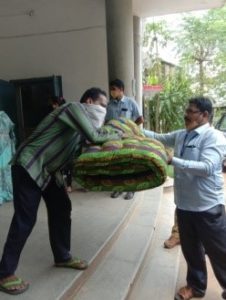
The lockdown had a devastating impact on society, including the poor and homeless. Daily wage-earners like manual labourers, scrap collectors, domestic workers, carpenters, rickshaw pullers and auto-rickshaw drivers were in danger of starving due to the lockdown. When the Government’s food supply dried up people went to bed without food. In the slums, there was no possibility for social distancing and personal hygiene could not be maintained with small rooms accommodating too many people for too many hours. BSSS stopped all its regular interventions and reduced all its expenses, pooled all the available resources possible and extended them to the slums and villages as the 3 phase of the intervention, with Dry food kits for their survival and hygiene kits for their protection, especially to the slums of Balasore and few areas of Bhadrak, Mayurbhanjand Keonjhardistricts too.
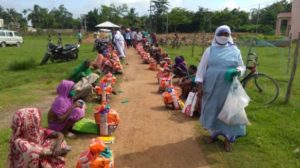 BSSS, reached out with relief materials, both Hygiene and dry food kits to 7450 families in 45Panchayats and several Slums so far, along with awareness creation during the lockdown.
BSSS, reached out with relief materials, both Hygiene and dry food kits to 7450 families in 45Panchayats and several Slums so far, along with awareness creation during the lockdown.
The Hygiene kit of BSSS contained masks, washing soaps and bathing soaps for the whole family. And theDry Food kit contained- Rice, Dal, Onions, potatoes, oilto sustain a family at least for 10 days.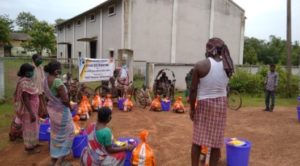
Special hygiene kits were provided to 2072 families, which contained – buckets, washing soaps, bathing soaps, masks, aqua tablets, women sanitary clothes and baby sanitary cloths along with dry food kits
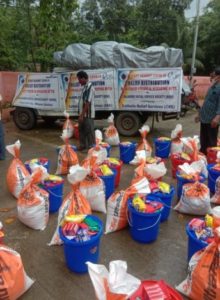 In collaboration with the District Administration, BSSS supported Maggi packets and baby clothes to hundreds of families with infants.
In collaboration with the District Administration, BSSS supported Maggi packets and baby clothes to hundreds of families with infants.
The lockdown and the cyclone Amphanwas severely challenging women’s and girls’ access to safe hygiene kits. Hence a package of Special Hygiene kits for women was provided to 500 selected families of 3 Panchayats of Bhogarai block of Balasore, who were affected by both Covid 19 and the cyclonic storm ‘Amphan’. 300 most vulnerable families from them were supported with an unconditional cash transfer of Rs. 5800 each, to cope up with the crisis.
BSSS supported 50 families of widows and differently-abled,from the slums of Balasore and nearby villages, for 6 consecutive months with a dry food kit, that contained sufficient food for a month and hygiene kit materials for the whole family.
The educational institutions in cities are offering online classes due to the lockdown, and kids at home using iPads, tabs and smartphones to learn. In the absence of gadgets, internet connection and in some cases even electricity, those living in the interior villages alternate educational facilities were not available. The children were left to themselves. Many children in the villages have forgotten what they have studied and it may result in dropouts. Many of th villages as the schools are closed the children have been migrating to cities in search of jobs to earn money. In such situation, BSSS reached out to 640 tribal students, with hygiene kits and dry food kits along with an awareness program. They, who are deprived of the online classes during the lockdown, are given special education through 43 village-based tuition centers. To keep the children occupied childrens parliament and other compitions were held in the tuition centers observing strictly the covid protocol. Students are motivated to keep abreast with their studies and parents appreciated this gesture of raching out to the children in this crisis. BSSS also facilitated General Health check-up for the children in many centers and provided them with the necessary medicines.
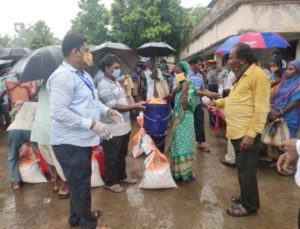 The lockdown affected transportation, access to health care facilities, and availability of medicines and consumables. This posed an immediate adverse effect on the outcome of dialysis patients and patients with kidney disease in India. BSSS reached out to the 11 dialysis patients, with 147 free dialyses over two months who were severely affected by the lockdown.
The lockdown affected transportation, access to health care facilities, and availability of medicines and consumables. This posed an immediate adverse effect on the outcome of dialysis patients and patients with kidney disease in India. BSSS reached out to the 11 dialysis patients, with 147 free dialyses over two months who were severely affected by the lockdown.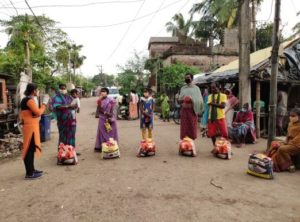
Many of the villages of India do not have access to TV or any other alternative means of communication. Very few possess a phone. The information and knowledge they had was received from the village health workers and the rumors that they heard from their relatives and friends from the cities. Therefore the seriousness of the pandemic was not felt as a result people walked about without following the protocol of covid like wearing masks, marinating distance, washing hands and using sanitizer. People even were refusing to get tested and they are hiding their sick. Hence in the 4th phase of Covid 19 intervention,BSSS launched a campaign on ‘Fighting Covid 19 – Be Aware Be Safe’,an awareness program which conscientised thousands in city and villages, vendors and shopkeepers, travellers and bystanders, in the district of Balasore and Mayurbhanj. Programs in the villages were conducted by gathering them in a small group of 15 and 20. The busy markets and circles were inspected and people who failed to follow the Covid protocol were advised and made to understand the seriousness of the pandemic individually and announcements were made regarding the same. Placards and banners were displayed and pamphlets were distributed to the people.
 The lockdown situation forced daily laborers to return their villages. Many of the people in the informal sector lost their jobs. They are mostly unskilled and have no way out to earn their livelihood. Therefore in the 5th phase of intervention, BSSS is reaching out to the 60 unemployed migrant youth, who were affected by the lockdown, to impart skill development training like electrician, automobile repairing, driving and tailoring to capacitate them to establish their self-employment in their localities. BSSS has a plan to further this skill development drive, to the more unemployed youth of the four districts of Balasore, Mayurbhanj, Bhadrak and Keonjhar.
The lockdown situation forced daily laborers to return their villages. Many of the people in the informal sector lost their jobs. They are mostly unskilled and have no way out to earn their livelihood. Therefore in the 5th phase of intervention, BSSS is reaching out to the 60 unemployed migrant youth, who were affected by the lockdown, to impart skill development training like electrician, automobile repairing, driving and tailoring to capacitate them to establish their self-employment in their localities. BSSS has a plan to further this skill development drive, to the more unemployed youth of the four districts of Balasore, Mayurbhanj, Bhadrak and Keonjhar.
BSSS women volunteers have stitched more than 40,000 masks which were distributed to the common people and volunteers at different levels.
Thanks to the great support BSSS received from the District Administration of Balasore, well-wishers and donor agencies like Caritas India, Caritas France, FdnF Switzerland, Catholic Health Association of India (CHAI), Manos Unidas, Help for Self-help, who came forward to support the humanitarian intervention of saving our fellow citizens, irrespective of any caste, gender or religion.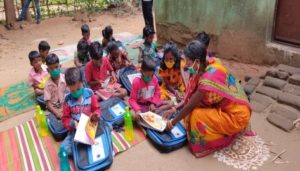
BSSS Family will march forward at any cost, leaving no stone unturned in serving the people in need, reaching out to the poor, joining hands with all the like-minded people who consider ‘humanity as one family and ‘caring for each other is one’s duty ’.
Fr. Lijo George, Director, BSSS
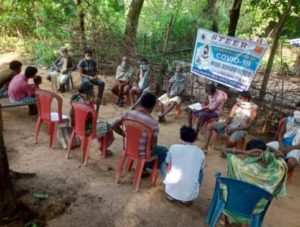
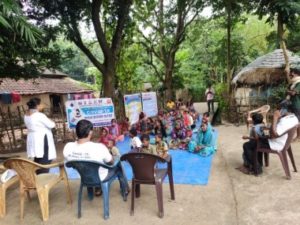
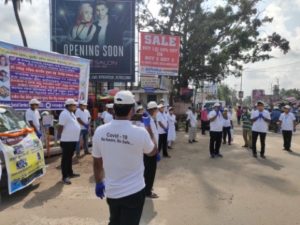
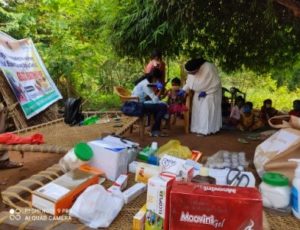

Laisser un commentaire